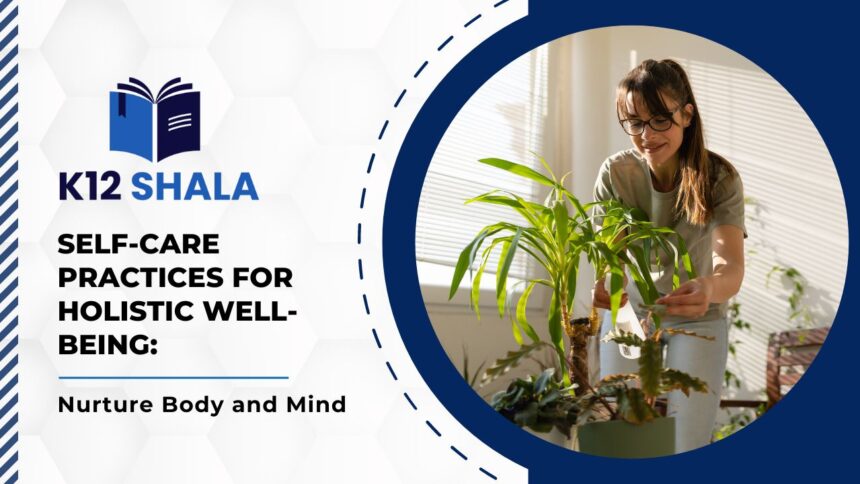Welcome to a journey of self-discovery and well-being! In the hustle and bustle of everyday life, it’s easy to forget to prioritize ourselves. Self-care isn’t just about bubble baths and face masks; it’s about nurturing our body, mind, and spirit in a holistic way. Join us as we explore various self-care practices that can help you cultivate a sense of balance, peace, and vitality in your life. Let’s dive into the art of caring for yourself from the inside out – because you deserve it!
Defining Self-Care and its Importance
Self-care is more than just a buzzword; it’s a fundamental pillar of well-being that encompasses taking intentional actions to nurture and prioritize your physical, mental, emotional, social, and spiritual needs. It goes beyond pampering oneself occasionally; it’s about creating sustainable habits that support your overall health.
At its core, self-care is an act of self-love and compassion. By investing time and energy into caring for yourself, you are acknowledging your worth and valuing your own wellness. It’s about recognizing that you deserve to feel good in all aspects of your life – physically, mentally, emotionally, socially, and spiritually.
In today’s fast-paced world where stress levels are high and demands are constant, practicing self-care becomes even more crucial. It serves as a powerful tool for managing stress, preventing burnout, fostering resilience, and promoting overall well-being. When we take care of ourselves, we are better equipped to handle life’s challenges and show up as our best selves in all aspects of our lives.
Physical Self-Care Practices
Taking care of your physical well-being is essential for overall holistic wellness. One key aspect of physical self-care is incorporating regular exercise and movement into your routine. Whether it’s a brisk walk, yoga session, or dance class, moving your body can boost mood and energy levels.
Proper nutrition also plays a vital role in physical self-care. Fueling your body with nourishing foods like fruits, vegetables, whole grains, and lean proteins can help you feel more vibrant and energized throughout the day.
In addition to exercise and nutrition, ensuring you get an adequate amount of rest and quality sleep is crucial. Sleep allows your body to repair itself and recharge for the next day ahead. Aim for 7-9 hours of quality sleep each night to support optimal physical health.
By prioritizing these physical self-care practices, you can nurture your body from the inside out and enhance your overall well-being.
Exercise and Movement
When it comes to self-care practices, incorporating exercise and movement into your daily routine is crucial for holistic well-being. Exercise not only benefits your physical health but also has a positive impact on your mental and emotional well-being.
Whether it’s going for a run, practicing yoga, or hitting the gym, finding activities that you enjoy can make all the difference in staying consistent with your fitness goals. Movement is not just about breaking a sweat; it’s about nourishing your body and releasing endorphins that elevate your mood.
Regular exercise helps reduce stress levels, improve sleep quality, boost confidence, and increase overall energy levels. It’s an essential part of taking care of yourself inside and out. So lace up those sneakers or roll out your mat – prioritize movement as a form of self-care to feel rejuvenated and empowered each day!
Proper Nutrition
Proper nutrition is a key aspect of self-care practices that contribute to holistic well-being. Nourishing your body with the right foods can have a significant impact on both your physical and mental health.
Eating a balanced diet rich in fruits, vegetables, whole grains, lean proteins, and healthy fats provides your body with essential nutrients for optimal functioning. Avoiding processed foods high in sugar, salt, and unhealthy fats can help prevent chronic diseases and promote overall wellness.
Listen to your body’s cues when it comes to hunger and fullness signals. It’s important to eat mindfully and savor each bite, rather than rushing through meals. Stay hydrated by drinking plenty of water throughout the day to support digestion, circulation, and cognitive function.
Remember that food is not just fuel but also a source of pleasure and enjoyment. Allow yourself occasional treats or indulgences without guilt. By nourishing your body with wholesome foods regularly, you are showing yourself love and care from within.
Adequate Rest and Sleep
Ensuring adequate rest and quality sleep is a crucial component of self-care practices. Sleep plays a vital role in overall well-being, impacting our physical, mental, and emotional health.
Creating a bedtime routine can help signal to your body that it’s time to wind down. This could include activities such as reading a book, taking a warm bath, or practicing relaxation techniques.
Setting up a comfortable sleep environment is also important. Make sure your bedroom is cool, dark, and quiet to promote deeper sleep. Investing in a good mattress and pillows can make a significant difference in the quality of your rest.
Avoiding stimulants like caffeine and electronic devices close to bedtime can help you fall asleep more easily. Additionally, maintaining consistent sleep schedules by going to bed and waking up at the same time each day can regulate your body’s internal clock.
Prioritizing restful nights of sleep will not only leave you feeling refreshed and energized but will also support your overall holistic well-being.
Mental and Emotional Self-Care Practices
In the realm of self-care, mental and emotional well-being plays a crucial role in achieving holistic balance. Managing stress and emotions is essential for overall health. Finding techniques to calm the mind and soothe the soul can significantly impact one’s quality of life.
Therapy or counseling provides a safe space to explore thoughts and feelings, allowing individuals to gain insights into their behaviors and patterns. It can be a powerful tool for personal growth and healing.
Mindfulness and meditation are practices that help cultivate awareness of the present moment. By focusing on breathing or engaging in mindful activities, one can reduce anxiety, improve concentration, and enhance overall emotional resilience.
Taking care of our mental health is not just about addressing challenges but also fostering positive emotions. Embracing self-compassion, practicing gratitude, and engaging in activities that bring joy are all vital components of mental and emotional self-care.
Stress Management Techniques
Feeling overwhelmed by stress is a common experience in today’s fast-paced world. However, it’s essential to prioritize self-care practices that can help manage and alleviate stress levels effectively.
One powerful technique for managing stress is deep breathing exercises. By focusing on your breath and taking slow, deep inhales and exhales, you can calm your nervous system and reduce feelings of anxiety.
Another effective method is practicing mindfulness. This involves staying present in the moment without judgment, which can help you let go of worries about the past or future.
Engaging in physical activity like yoga or going for a walk can also be beneficial for reducing stress. Exercise releases endorphins, which are natural mood lifters that can combat feelings of tension and worry.
Incorporating stress-relief activities into your daily routine, such as journaling, listening to music, or spending time in nature, can provide much-needed moments of relaxation amidst life’s demands.
Therapy or Counseling
Therapy or counseling is a valuable self-care practice that provides a safe space for individuals to explore their thoughts, emotions, and behaviors. It allows you to work through past traumas, current struggles, and future goals with the guidance of a trained professional.
Engaging in therapy can help you gain insight into patterns of thinking and behavior that may be holding you back from true holistic well-being. By talking openly and honestly with a therapist, you can learn healthy coping mechanisms, improve communication skills, and develop strategies to better manage stress and anxiety.
Therapy is not just for those experiencing severe mental health issues; it is beneficial for anyone looking to enhance their self-awareness and personal growth. Whether you seek individual therapy, couples counseling, or group sessions, the support and guidance provided by a therapist can lead to positive changes in your life.
Remember that seeking therapy is an act of courage and self-compassion. It’s okay to ask for help when needed – taking care of your mental health is an essential part of nurturing your overall well-being.
Mindfulness and Meditation
In today’s fast-paced world, finding moments of peace and stillness is crucial for our overall well-being. Mindfulness and meditation are powerful practices that can help us cultivate a sense of inner calm amidst the chaos of daily life.
Mindfulness involves being fully present in the moment, focusing on your thoughts, feelings, and sensations without judgment. It allows you to observe your emotions without getting swept away by them, promoting self-awareness and emotional resilience.
Meditation, on the other hand, is a practice that involves training your mind to achieve a state of deep relaxation and heightened awareness. By taking time each day to sit quietly and breathe deeply, you can reduce stress levels, improve concentration, and enhance mental clarity.
Both mindfulness and meditation offer numerous benefits for our mental health, including reducing anxiety and depression symptoms. Incorporating these practices into your daily routine can help you develop a greater sense of peace and balance in your life.
Social Self-Care Practices
Building supportive relationships is a key aspect of social self-care. Surrounding yourself with people who uplift and encourage you can have a positive impact on your overall well-being. Whether it’s friends, family members, or colleagues, having a strong support system can provide comfort during challenging times.
Setting boundaries is another crucial component of social self-care. Learning to say no when needed and prioritizing your own needs in relationships is essential for maintaining healthy connections. Boundaries help protect your mental and emotional health by ensuring that you are not overextending yourself or compromising your values.
Taking the time to invest in meaningful connections and nurture existing relationships can contribute to a sense of belonging and fulfillment in life. By fostering positive interactions with others, you create a supportive network that promotes mutual growth and well-being.
Building Supportive Relationships
Building supportive relationships is a crucial aspect of self-care practices. Surrounding yourself with people who uplift and encourage you can have a significant impact on your overall well-being. It’s essential to cultivate connections that bring positivity into your life.
Seek out friends, family members, or even support groups where you feel understood and accepted. These relationships provide a sense of belonging and emotional support during challenging times. Sharing your thoughts and feelings with trusted individuals can help alleviate stress and promote mental health.
Communication is key in fostering healthy relationships. Be open, honest, and authentic in your interactions to build trust and deepen connections. Show empathy towards others’ experiences and offer support when needed.
Setting boundaries within relationships is also important for maintaining balance and protecting your own mental health. Learn to say no when necessary and prioritize your well-being above all else. Choose quality over quantity when it comes to the company you keep.
Setting Boundaries
Setting boundaries is a crucial aspect of self-care practices. It involves recognizing your limits and communicating them effectively with others. Boundaries help protect your mental and emotional well-being by ensuring you prioritize your needs.
Establishing boundaries may involve learning to say no without feeling guilty, clearly defining what behaviors are acceptable or not, and advocating for yourself when necessary. By setting healthy boundaries, you create space for positive relationships that respect and value your limits.
Remember that setting boundaries is not about building walls but rather about fostering healthier connections. It allows you to establish mutual respect in relationships while maintaining a sense of self-empowerment. Embrace the power of setting boundaries as an essential part of nurturing holistic well-being.
Spiritual Self-Care Practices
Spiritual self-care practices are essential for nurturing the connection between mind, body, and soul. One powerful way to practice spiritual self-care is by immersing yourself in nature. Spending time outdoors can help you feel grounded and connected to something greater than yourself. Whether it’s a walk in the park or a hike in the mountains, nature has a way of soothing the spirit.
Another important aspect of spiritual self-care is practicing gratitude. Taking time each day to reflect on what you are grateful for can shift your perspective and bring more positivity into your life. It could be as simple as appreciating a beautiful sunset or expressing thanks for supportive relationships.
Engaging in activities that align with your values and beliefs can also foster spiritual well-being. This might include volunteering, attending religious services, or participating in rituals that hold personal significance for you. By nourishing your spiritual side, you can cultivate inner peace and harmony amidst life’s challenges.
Connecting with Nature
There’s a certain magic in connecting with nature that can soothe the soul and invigorate the spirit. Stepping outside into the fresh air, surrounded by trees, flowers, and open skies, has a way of grounding us in the present moment.
Whether it’s taking a leisurely stroll through a park, hiking in the mountains, or simply sitting by a tranquil lake, nature offers countless opportunities for relaxation and rejuvenation. The gentle rustle of leaves in the wind or the chirping of birds can be music to our ears amidst the noise of daily life.
Feeling the sun on your face or dipping your toes into cool water can awaken your senses and bring a sense of peace. Observing natural beauty – from vibrant sunsets to blooming flowers – reminds us of the wonder and awe that exists beyond our busy schedules.
So next time you’re feeling overwhelmed or stressed, take a moment to step outside and connect with nature. Allow yourself to be present in its healing embrace and let its calming influence wash over you like a gentle wave.
Practicing Gratitude
Practicing gratitude is a powerful self-care practice that can have a profound impact on your holistic well-being. It involves taking the time to acknowledge and appreciate the things in your life that bring you joy, happiness, and fulfillment.
When you cultivate a mindset of gratitude, you shift your focus from what is lacking in your life to what you already have. This shift in perspective can help reduce feelings of stress, anxiety, and discontent.
One way to practice gratitude is by keeping a daily gratitude journal where you write down three things you are thankful for each day. This simple exercise can help rewire your brain to focus on the positive aspects of your life.
Another way to incorporate gratitude into your daily routine is by expressing appreciation towards others. Whether it’s through a heartfelt thank-you note or a simple gesture of kindness, showing gratitude towards others can strengthen relationships and foster deeper connections.
By making gratitude a regular part of your self-care routine, you invite more positivity and abundance into your life while nurturing your mental and emotional well-being.
Conclusion
Practicing self-care is essential for achieving holistic well-being. By nurturing your body, mind, emotions, social connections, and spirit, you can create a balanced and fulfilling life. Remember that self-care looks different for everyone, so take the time to explore what practices work best for you. Prioritize yourself and make self-care a non-negotiable part of your routine. Your overall health and happiness will thank you in the long run. Start incorporating these practices into your daily life today to start reaping the benefits of a more mindful and fulfilled existence.










